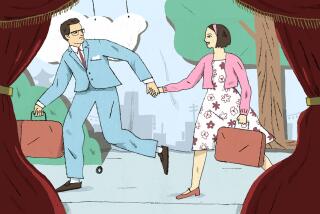A Marriage--and Book--on Shaky Ground
- Share via
“Can this marriage be saved?” the Ladies Home Journal has been asking in a monthly advice column since 1953. These days, though, the more commonly asked question seems to be: Should this marriage be saved? Thus, in a recent issue of the women’s magazine Mirabella, a longtime marriage therapist confesses that she no longer considers “staying the course” to be the preeminent goal of her work, or of a marriage.
Both the “can” and the “should” are present in Jack Driscoll’s well-paced, expertly crafted “Lucky Man, Lucky Woman.” In his finely nuanced prose, Driscoll takes us through several months of the troubled but far-from-over union of Perry and Marcia Lafond, a New England couple in their late 30s. But pacing, craft and nuance cannot, ultimately, save this deeply flawed novel of marital discord.
Marcia, an elementary-school teacher, is calm and sleek and centered, a woman of “eternal composure” and natural grace. Her absolute favorite movie is “Mystic Pizza” (she walks out of “The Seventh Seal”), and she desires nothing more than to have a baby and buy a house. Perry, a probation officer, is roiling: Though he loves Marcia “more than he ever has--much more,” he is chafing at the “measured, debilitating boundaries of marriage.” He is terrified that he has “inherited both his mom’s paralysis and his dad’s untreatable and monstrous resign.” He is plagued by guilty nightmares about the childhood death of his sister. He’s highly dubious of Marcia’s “drug-induced and desperate” baby-making project. And he’s wildly attracted to Angela Knudson, the wife of one of his parolees. Angela is everything Marcia is not: poor, uneducated, vulnerable, damaged, a mother, and pregnant.
Marcia says things like “It’ll be the children who save us” and “Why can’t grown-ups grow up?” and “Stay poised and level-headed.” While she religiously takes her Pergonal shots, Perry roars around on his Harley-Davidson (which Marcia hates), smokes his unfiltered Camels (Marcia has forbidden pot), descends into a sort-of breakdown (“your Grim Reaper routine,” Marcia says), and reads Nietzsche (a downer, Marcia thinks). In short, though Perry may be a screw-up, Marcia is a drip. And so, in the midst of Driscoll’s apparently modern novel about an apparently modern couple, several suspiciously ancient tropes emerge: Perry acts, Marcia reacts; Perry questions, Marcia reassures; Perry changes, Marcia conserves. Perry yearns for authenticity; Marcia wants a mortgage.
Driscoll is convincing in his depiction of Perry’s passionate feelings toward Angela--feelings that she is, rightly, suspicious of, and that she knows she cannot afford. Convincing, too, is the author’s exploration of the reality-rupturing web of artifice Perry begins constructing to hide those feelings: “[T]here’s this dark place in yourself that can never be trusted, that doesn’t give a [damn] about truth or lies. . . . He’s afraid . . . that he’ll enter that place, pawing the walls for a light switch, but there won’t be any light--there never is, not there.” And Driscoll delicately delineates the oppositional dance that parents and children seem doomed to choreograph forever.
Ultimately, though, Driscoll’s finely detailed examination of a marriage in crisis is not enough to sustain us--and quoting Nietzsche doesn’t help things at all.
More to Read
Sign up for our Book Club newsletter
Get the latest news, events and more from the Los Angeles Times Book Club, and help us get L.A. reading and talking.
You may occasionally receive promotional content from the Los Angeles Times.








